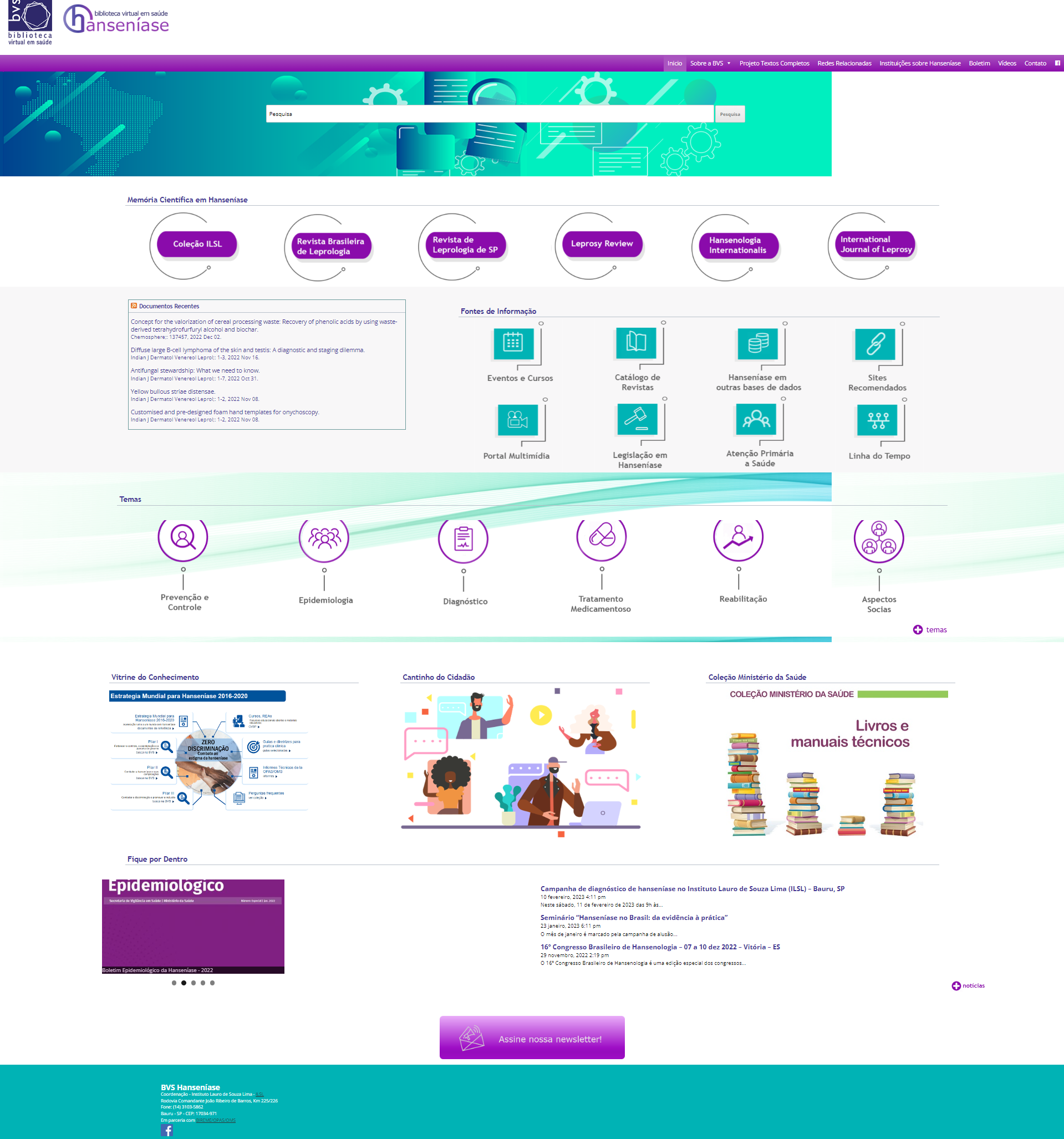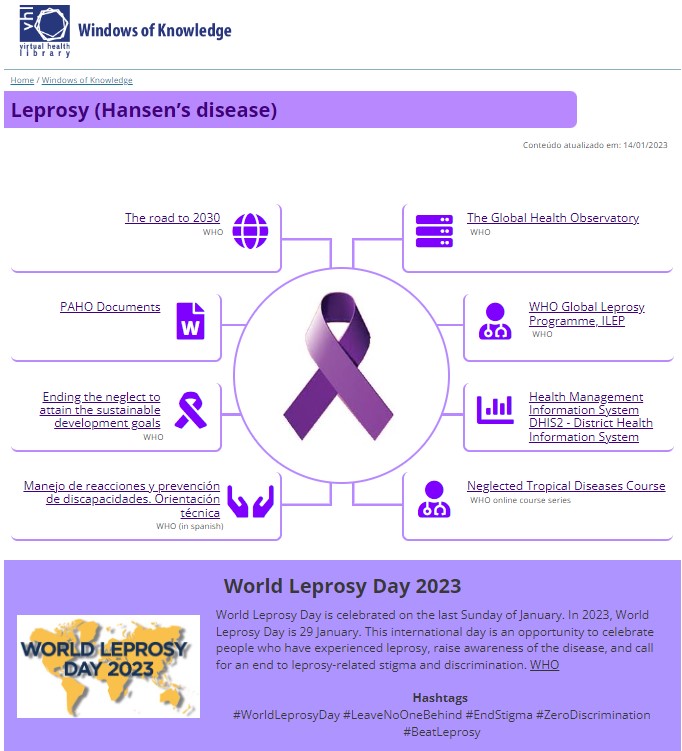World Leprosy Day is celebrated on the last Sunday in January. In 2023, this international day, which falls on January 29th, is an opportunity to raise awareness about the disease and combat stigma and discrimination related to leprosy. The theme of the 2023 campaign is “Act Now. End Leprosy” and calls attention to three main messages:
- Elimination is possible: we have the power and the tools to interrupt transmission and end the disease.
- Act now: We need resources and commitment to end leprosy. We need to prioritize leprosy elimination.
- Reach the unreached: Leprosy is preventable and treatable. Suffering from leprosy is unnecessary.
About leprosy
Leprosy is an infectious disease caused by the bacteria Mycobacterium leprae or Hansen’s bacillus. The bacillus reproduces very slowly, and the average incubation period and onset of signs and symptoms of the disease is approximately five years. The initial symptoms are light or dark spots or nodules on the skin, resulting in skin lesions and loss of sensation in the affected area. Other symptoms include muscle weakness and tingling sensations in the hands and feet. When cases are not treated at the onset of signs and symptoms, the disease can cause progressive and permanent sequelae, including deformities and mutilations, reduced mobility of the extremities, and blindness.
The disease primarily affects the skin, nerves, mucous membranes of the upper respiratory tract, and the eyes. In some cases, the symptoms may appear nine months after acquiring the infection and in other cases it may take up to 20 years. Leprosy is not highly infectious and is transmitted through close and frequent contact with untreated infected people.
It is a curable disease with a combination of antibiotics known as multidrug therapy. This treatment is available free worldwide through World Health Organization programs. If leprosy is left untreated, it can lead to serious complications.
Leprosy is at least 4,000 years old, making it one of the oldest diseases known to mankind. However, it is possible that this generation will finally end leprosy transmission – the goal is to reach 120 countries with zero new autochthonous leprosy cases by 2030. Although about 200,000 people were diagnosed with leprosy each year before covid-19, that number has dropped by 30 percent due to pandemic disruptions in leprosy programs. Many millions live with leprosy-related disabilities, mainly in Asia, Africa, and South America.
Scientific and technical information on leprosy
The rapid exchange of timely and reliable clinical and epidemiological information, widely accessible to academics, technicians, health professionals, researchers, and the general population, is a relevant factor to consolidate the ongoing process of leprosy elimination as a public health problem in Brazil, paving the way for the eradication of the endemic disease, as well as of discrimination and social stigma.
Offering scientific information about leprosy in an open and universal way contributes to the global goal of eliminating the disease and to the development of research that aims to improve the patient’s quality of life. Moreover, equitable access to information is an essential condition for improving health conditions and increasing the quality of life of individuals and society.
Created in 2007, the Leprosy VHL is coordinated by the Instituto Lauro de Souza Lima in cooperation with BIREME/PAHO/WHO, with the support of national and international institutions with recognized experience in the area. In 2020, the Term of Agreement 71 (TC71) was formalized between the General Coordination of Surveillance of Diseases in Elimination of the Department of Diseases in Chronic Conditions and Sexually Transmitted Infections of the Health Surveillance Secretariat of the Ministry of Health of Brazil (CGDE/DCCI/SVS/MS) and PAHO/WHO Brazil through BIREME, and aimed at developing activities for the improvement and strengthening of public policies for the surveillance and prevention of leprosy and other diseases in elimination recommended by the Brazilian Unified Health System (SUS).
 The Leprosy VHL aims to gather, organize, and disseminate the scientific and technical production on leprosy, contributing to actions to achieve the global goal of its eradication in the development of studies and research that contribute to the preservation of history, development of public policies and improvement of social conditions of people affected by the disease.
The Leprosy VHL aims to gather, organize, and disseminate the scientific and technical production on leprosy, contributing to actions to achieve the global goal of its eradication in the development of studies and research that contribute to the preservation of history, development of public policies and improvement of social conditions of people affected by the disease.
The Leprosy VHL offers exclusive national and international content and is organized in sections such as: Search in Databases, Leprosy Scientific Memory Collection, Citizen’s Corner, Ministry of Health Collection, Timeline of Leprosy, Thematic Areas, Multimedia Portal, VHL Bulletin, News, Events and Courses Calendar, Recommended websites, Legislation, and Catalogue of Journals and Rare Works, among others. Short videos detailing the Leprosy VHL’s resources and services are also available.
 The Leprosy Window of Knowledge is regularly updated and contains information for health professionals, researchers, and the general public in Portuguese, English, and Spanish. The Window of Knowledge provides current documents on the theme, highlighting the World Day, search strategies on “Ending stigma and discrimination” and “Leprosy and covid-19”, videos, and websites of interest, among others.
The Leprosy Window of Knowledge is regularly updated and contains information for health professionals, researchers, and the general public in Portuguese, English, and Spanish. The Window of Knowledge provides current documents on the theme, highlighting the World Day, search strategies on “Ending stigma and discrimination” and “Leprosy and covid-19”, videos, and websites of interest, among others.
Links of interest
World Health Organization. Leprosy World Day 2023. Available from: https://www.who.int/news-room/events/detail/2023/01/29/default-calendar/act-now-end-leprosy-wld-2023
Pan American Health Organization. Leprosy. Available from: https://www.paho.org/en/topics/leprosy
Leprosy Virtual Health Library. Available from: https://hansen.bvs.br/ (only in Portuguese)
Window of Knowledge Leprosy. Available from: https://bvsalud.org/vitrinas/en/post_vitrines/leprosy-hansens-disease/
International Federation of Anti-Leprosy Associations – https://ilepfederation.org/